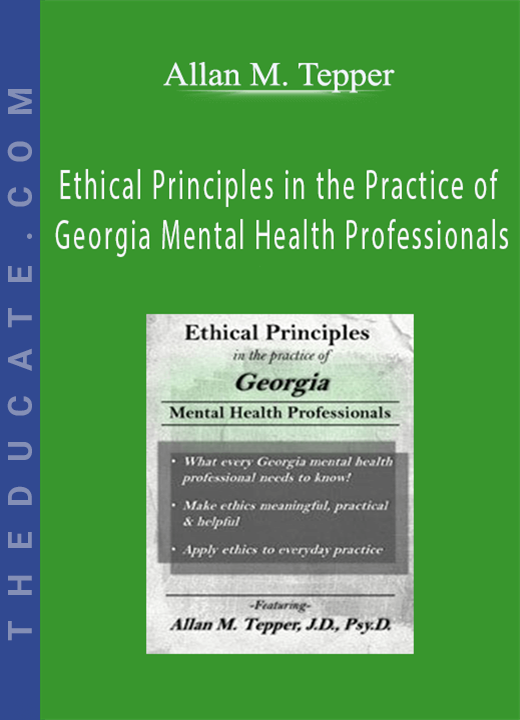Description
Ethical Principles in the Practice of Georgia Mental Health Professionals – Allan M. Tepper
Many continuing education ethics programs are generic in nature. Many continuing education ethics programs stress risk management strategies to the detriment of the attendees, especially if an attorney presenter is involved.
This program is different. Rather than avoiding clinical issues, this program explores the manner by which clinical and ethical issues affect the everyday practice of the mental health professional in Georgia. This unique blend of clinical and ethical concerns allows for a more meaningful understanding and interpretation of the rules that govern mental health practice.
These goals are reached through the experience and the interactive style of the presenter, Allan M. Tepper, J.D., Psy.D. Different from other individuals who possess joint degrees in psychology and law, Dr. Tepper actually maintains an active psychology practice and an active law practice. He functions as a clinician, and he represents mental health professionals who experience legal difficulties. In this regard, Dr. Tepper brings an extremely unique perspective to the practical understanding of ethics.
These goals also are reached through the manual utilized in this seminar. The manual materials are not generic in nature. All of the written materials are state specific to Georgia.
When interacting with an attorney, it sometimes is difficult to hear the words, “Trust me.” For this recording, however, we do say, “Trust us!!” We guarantee, you won’t walk away disappointed.
- Determine specific state and administrative laws that are pertinent to establishing and maintaining an ethical clinical practice.
- Develop policies on ethical issues such as restraints, seclusion and informed consent.
- Determine which notes, documents, reports, forms, and clinical data constitute an official medical record in the state of Georgia.
- Evaluate your current record-keeping practices in order to ensure compliance with ethical and legal requirements in the state of Georgia.
- Designate the treatment provider’s responsibilities relating to mental health issues and duty to warn law in Georgia.
- Explore the legal and ethical considerations for the treatment of minor populations in Georgia with regard to age of consent, confidentiality and custody concerns.
Get Ethical Principles in the Practice of Georgia Mental Health Professionals of author Allan M. Tepper
Understand the Legal System
- Statutes
- Rules and regulations
- Case law
- Finding the law
Legal Exposure
- Criminal liability
- Civil liability
- Licensing complaints
- Organization complaints
Establish the Treatment Relationship
- The professional relationship
- The legal and ethical principle of informed consent
- Informed consent as part of the treatment modality
- Use of and reliance upon written consent forms
Record-Keeping Practices
- Record-keeping regulations
- Items which constitute the record, personal notes vs. charting, raw data, computer printouts and third-party records
- Access to records by written requests, subpoenas and court orders
The Ethics of Duty to Warn
- Duty to warn potential third-party victims
- Review of specific Georgia case law governing danger to others
- A clinical approach to the duty to protect
Treatment of Minors
- Age of majority
- Consent to treatment and access to records
- Clinical implications in the treatment of the older adolescent
- Treatment of minors in situations of family separation and divorce
Non-Sexual Boundary Violations
- Email correspondence and cell phone contacts
- Treatment vs. advocacy for patients
- Professional contacts with attorneys and the legal profession
- In-court expert testimony
Instant Access Available
Downloadable Content

Sale Page: https://catalog.pesi.com/item/32173/







10 reviews for Ethical Principles in the Practice of Georgia Mental Health Professionals – Allan M. Tepper
There are no reviews yet.